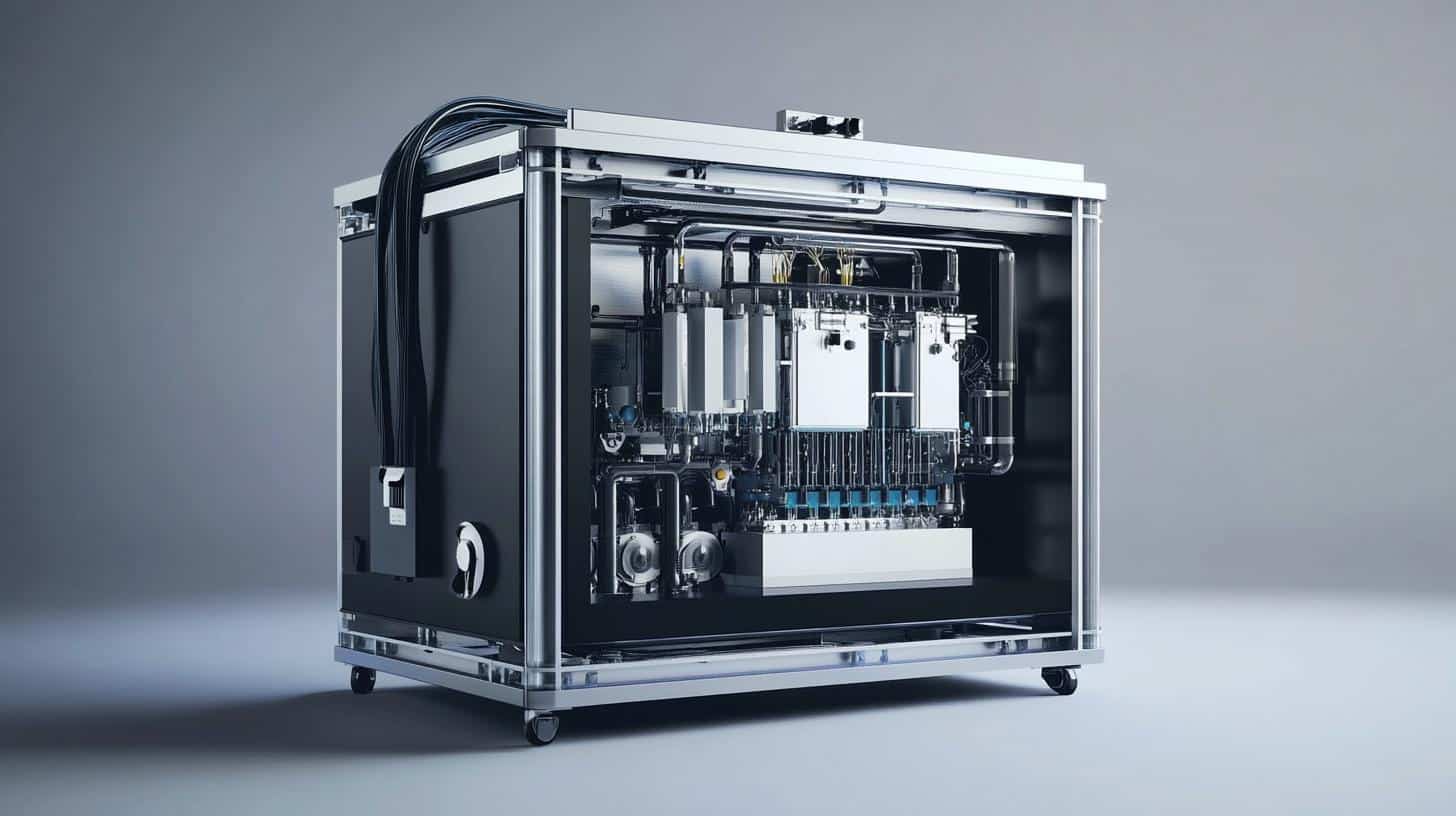In an era where energy efficiency and sustainability are becoming paramount, the advent of portable energy sources is reshaping how we think about power generation and consumption. Among these innovations, the emergence of the 1 kW hydrogen fuel cell is a groundbreaking step. This technology not only promises to deliver reliable energy on-the-go but also aligns perfectly with global goals for reducing carbon emissions and enhancing energy independence.
Hydrogen fuel cells operate on a simple principle: they convert hydrogen and oxygen into electricity, with water as the only byproduct. This process makes them extremely eco-friendly, positioning fuel cells as an attractive alternative to fossil fuels. The 1 kW variant caters specifically to portable applications, providing sufficient power for a range of devices and systems while maintaining the benefits of hydrogen technology.
One of the most significant advantages of hydrogen fuel cells is their efficiency. Compared to traditional combustion engines and even batteries, hydrogen fuel cells can convert a higher percentage of their fuel into usable energy. For example, while internal combustion engines may convert only about 20% of the energy found in fuel into motion, hydrogen fuel cells can reach efficiencies of 40% to 60%. This means that for the same amount of energy input, users can expect longer operation times and greater reliability from hydrogen-powered devices.
Moreover, the 1 kW output of modern hydrogen fuel cells is particularly advantageous for small-scale applications like outdoor recreational activities, emergency backup systems, and even portable electronics. With the ability to power everything from campsite tools to electric scooters, this versatile energy source encourages a shift towards cleaner alternatives in everyday life. As the technology matures, manufacturers are actively seeking to integrate these fuel cells into various markets, ranging from automotive to consumer electronics.
Infrastructure development is crucial for the widespread adoption of hydrogen fuel cells. While hydrogen is the most abundant element in the universe, its production, storage, and distribution present challenges. Current methods often involve the extraction of hydrogen from natural gas, which, although more efficient than traditional fuels, still emits carbon dioxide. However, advancements in green hydrogen production, utilizing renewable energy sources like solar and wind power to split water molecules, could eliminate these concerns and make hydrogen a truly sustainable energy source.
Another critical aspect to consider is the safety and feasibility of hydrogen fuel cells. Historically, hydrogen has been viewed as a hazardous material due to its flammability. However, with improved technologies and regulations, fuel cell systems designed for portable use are increasingly secure and manageable. Engineers have developed numerous safety measures, including leak detection systems and robust materials, to ensure safe operation in various environments.
In conclusion, the 1 kW hydrogen fuel cell marks a pivotal moment in the pursuit of sustainable energy solutions. By combining efficiency, versatility, and environmental benefits, this technology has the potential to revolutionize portable energy sources, leading to enhanced energy independence and reduced ecological footprints. As we continue to innovate and invest in hydrogen infrastructure, the future looks bright for clean transportation and sustainable energy production, paving the way for a greener tomorrow.
Efficient Energy: Tips, Hacks, and Interesting Facts about Hydrogen Fuel Cells
As the world shifts toward sustainable energy solutions, understanding the practical applications of emerging technologies like the 1 kW hydrogen fuel cell becomes increasingly important. Here are some useful tips, life hacks, and intriguing facts related to the incredible potential of hydrogen fuel cells.
1. Enhance Your Outdoor Adventures
If you enjoy camping or outdoor activities, consider investing in a portable hydrogen fuel cell. Not only can it power camping gear like portable stoves, lights, and even charging stations for electronics, but it also operates quietly compared to traditional gas generators. Using a hydrogen fuel cell ensures a cleaner environment, allowing you to enjoy nature without the noise or pollution.
2. Create a Backup Power Supply
Hydrogen fuel cells can serve as an excellent emergency backup power source. By integrating a 1 kW hydrogen fuel cell into your home, you can ensure a reliable supply of energy during blackouts. This energy independence is crucial in areas prone to electrical outages. Combine this with solar panels, and you can create a self-sufficient energy system.
3. Embrace Green Hydrogen Production
As mentioned, the future of hydrogen energy lies in green hydrogen production. You can play your part by opting for renewable energy suppliers to power your own hydrogen generation systems. By using wind or solar energy to produce hydrogen, you help reduce greenhouse gas emissions and promote sustainability within your community.
4. Understand Hydrogen Fuel Cell Safety
While some may have concerns about hydrogen’s flammability, modern hydrogen fuel cells are designed with numerous safety features. From advanced leak detection systems to rugged construction materials, you’re likely to find that these systems are safer than many traditional power sources. Familiarizing yourself with these safety measures can help alleviate worries and showcase the practicality of hydrogen energy in everyday use.
5. Join the Hydrogen Movement
Get involved in local or online communities focused on sustainable energy and hydrogen technology. Sharing tips and experiences with others can greatly enhance your knowledge, and you may discover innovative applications for hydrogen fuel cells that you hadn’t thought of. Plus, staying informed about ongoing developments in hydrogen infrastructure keeps you ahead of the curve regarding clean energy initiatives.
Interesting Facts to Consider:
– Hydrogen is the most abundant element in the universe, making it a seemingly limitless fuel source.
– The only byproduct of hydrogen fuel cells is water, making them a near-zero-emission technology.
– Hydrogen fuel cells can outperform traditional batteries when it comes to longer operation times and quicker refueling processes.
As the demand for sustainable energy grows, keep exploring innovative technologies that can enhance your lifestyle while protecting the environment. The 1 kW hydrogen fuel cell is just one of many advancements paving the way for sustainable energy solutions.
For more insights into innovative energy solutions and to stay updated on sustainable practices, check out the U.S. Department of Energy and H2 Revolution
The article has been updated: 2024-11-06 16:30
Here are some suggested related links:
1. U.S. Department of Energy – The official website providing information on energy resources and technology innovations, including hydrogen fuel cells.
2. Hydrogen Fuel News – A news outlet dedicated to the latest developments and advancements in hydrogen fuel technology.
3. National Renewable Energy Laboratory – A research laboratory that focuses on renewable energy and energy efficiency innovations, including hydrogen fuel cells.
4. FuelCell Semiconductor – A company specializing in advanced fuel cell technology, providing insights into portable energy solutions.
5. Hydrogen and Fuel Cells Program – A government program info page that focuses on research and development of hydrogen technologies.
6. World Hydrogen Energy Summit – A leading event that showcases the latest developments in hydrogen energy solutions and networking opportunities.
7. International Electrotechnical Commission – An organization that develops international standards for electrotechnology, covering various aspects of fuel cell technology.
8. ScienceDirect – A leading source for scientific and technical research, featuring academic articles on hydrogen fuel cells and energy solutions.
9. ResearchGate – A platform for researchers to share their findings and insights, including studies on hydrogen fuel cells and energy efficiency.
10. The Guardian – A major news outlet that often covers topics related to sustainable energy and innovations, including hydrogen energy developments.
The article has been updated: 2024-11-07 06:40
What are the key advantages of using a 1 kW hydrogen fuel cell as a portable energy source?
The key advantages of using a 1 kW hydrogen fuel cell as a portable energy source include its high efficiency, low environmental impact, and versatility. Unlike traditional fossil fuels, hydrogen fuel cells emit only water vapor when generating electricity, making them environmentally friendly. The 1 kW output is ideal for various applications, from powering small devices to providing backup energy for residential use. Additionally, hydrogen fuel cells can be refueled quickly and have a longer operation time compared to battery-powered systems, which are limited by charge cycles and capacity. This revolutionary portable energy source represents a significant step towards sustainable energy solutions and energy independence.

















